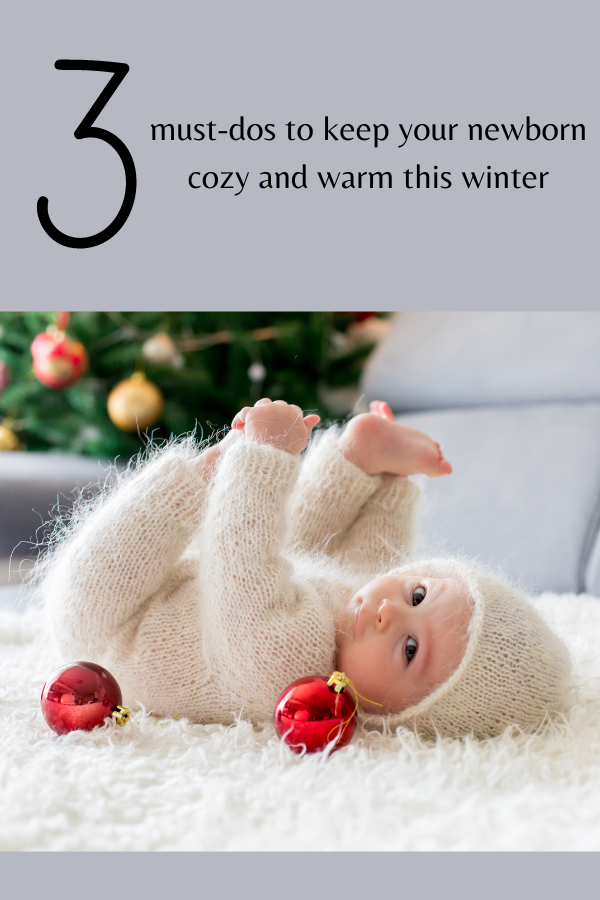Winter is a special time of the year, but it can also be a challenging one when you have a new baby. Keeping your newborn warm and comfortable during the colder months is crucial, and it’s important for new parents to be prepared for the challenges that winter can bring. Preparing your home and keeping your baby warm and safe outdoors requires some expert advice and tips to help you navigate the winter months with ease.

The winter can be stressful and it is even more so when you are not sleeping well and feel overwhelmed with everything. Adding the challenges of winter can be downright annoying. However, when you know what to expect and can plan for things then the winter will go smoothly. In this article, we’ll cover everything you need to know about how to deal with winter with a newborn.
Have the right clothing and gear
It is tricky to know how to dress a newborn since they have trouble regulating their internal body temperature. Hats are a must for newborns. They lose most of their body heat through their head, so a warm hat is essential to keep them warm. Look for hats that are made from a soft, breathable material and have a snug fit to keep them securely in place. Mittens are also important to keep little hands warm.
It is also important to remember that babies need to be dressed in one more layer than adults. Always check on the baby’s temperature by feeling its back or chest, if it feels cool or damp, it’s time to add another layer.
In bed, they should be dressed in baby sleepers and possibly even a fleece swaddle depending on the thickness of the sleeper. It’s not a good idea to keep a blanket in the crib for fear of them getting tangled in it and suffocating. When the baby is in a stroller then a blanket works fine. Look for blankets made from warm materials such as fleece or wool, and make sure they are large enough to cover your baby and tuck securely around them.
Instead of a stroller, consider investing in a baby carrier. This can be a great way to keep your baby close to you and keep them warm while you’re out and about. Look for a carrier that is designed for newborns, and that is made from a warm, breathable material.
Keep the house warm
During this time of inflation and high energy costs, it is tempting to keep the house cool and bundle up to save money. However, you have to be careful doing this when you have a newborn. It is important to have a warm and cozy house to avoid any potential problems.
First, make sure your home is properly insulated. You should do this anyway since it is always wise to not waste heat in the winter months anyway. This will help to keep the warm air inside and the cold air outside, making it more comfortable for your baby. Check for drafts around windows and doors and make sure they are properly sealed. If you have an older home, think about having a professional inspect your insulation to ensure that it is up to date.
Another important aspect to consider is the heating system. Make sure that your heating system is in good working order and that it is set to a comfortable temperature for your baby. Use a programmable thermostat to ensure that your home is warm when you need it to be. If you have a fireplace, make sure that it is properly maintained and that the chimney is clean to prevent carbon monoxide poisoning.
Humidifiers and air purifiers can also be beneficial for newborns during the winter months. Humidifiers help to add moisture to the air, which can help to prevent dry skin and coughing. Air purifiers, on the other hand, can help to remove pollutants and allergens from the air, which can be especially beneficial for newborns with sensitive skin or respiratory issues.
How to deal with winter colds
Being inside all the time will expose you and your newborn to many different pathogens that build up in the stale air. This means that it is almost guaranteed that you both will be getting sick with colds and other viruses in the winter. If you deal with them well then it shouldn’t be a problem but you do need to be careful since newborns have a fragile immune system early in their lives.
It’s important to maintain good hygiene practices to prevent the spread of germs. This includes washing your hands frequently and avoiding close contact with anyone who is sick. Also, make sure to keep your baby’s hands and face clean to prevent them from picking up germs.
It’s also important to be aware of the common winter illnesses that can affect newborns. These include colds, flu, and RSV (respiratory syncytial virus). Colds typically cause a runny nose, cough, and low-grade fever, while flu symptoms are usually more severe and can include high fever, body aches, and fatigue. RSV, on the other hand, is a virus that primarily affects the respiratory system and can cause severe coughing, wheezing, and difficulty breathing.
Keep your baby well-hydrated and well-rested to help them fight off the illness. And, use a humidifier to help keep the air moist, which can help relieve congestion and coughing. If your baby does get sick, it’s important to seek medical attention as soon as possible. Your pediatrician may recommend over-the-counter medications such as acetaminophen or ibuprofen to help relieve symptoms, but it’s always best to consult with a doctor before giving your baby any medication.
Conclusion
If your baby does get sick, it’s important to seek medical attention as soon as possible. Your pediatrician may recommend over-the-counter medications such as acetaminophen or ibuprofen to help relieve symptoms, but it’s always best to consult with a doctor before giving your baby any medication.
Latest posts by Meredith (see all)
- Somewhere Beyond the Sea Book Club Discussion - January 10, 2025
- Here One Moment Book Club Discussion - November 8, 2024
- Create Fun Halloween Decor with a Decoupage Pumpkin Craft! - October 21, 2024


Leave a Reply